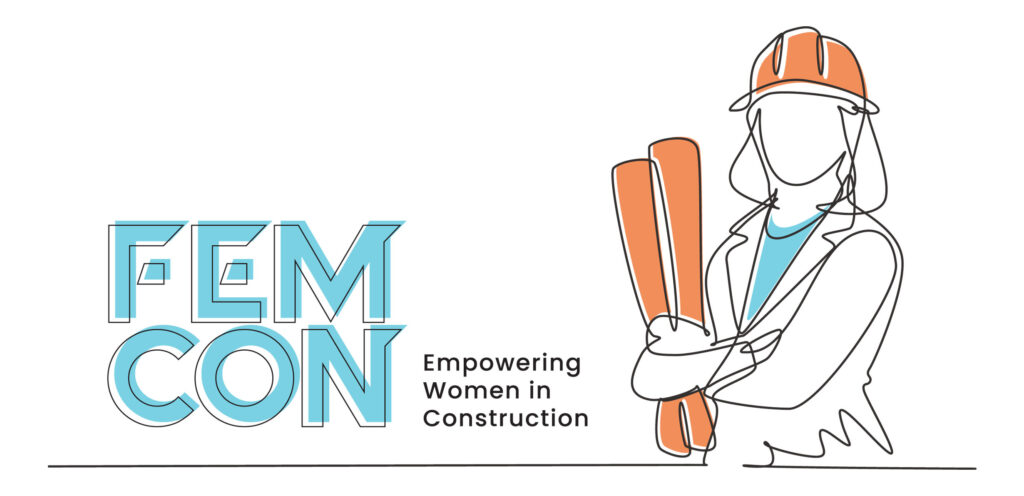Across Europe, the construction industry stands as a symbol of strength and development, yet it also reflects a striking gender disparity. Women remain significantly underrepresented in this vital sector, facing barriers that hinder their participation and advancement. The construction industry boasts the highest share of male employees, with women comprising only a small fraction of the workforce. This lack of gender diversity poses several challenges, limiting economic growth, perpetuating stereotypes, and denying women access to fulfilling career opportunities. However, amidst these challenges, a beacon of hope shines through the FEMCON project. By developing innovative vocational education and training tools, FEMCON aims to empower women in the construction industry and create conditions for positive change to flourish. In this blog post, we will delve into the urgent need to include more women in construction across Europe and explore how FEMCON’s objectives can revolutionize the industry for the better.
The 5 Roles of Vocational Educators and Trainers
As the construction industry strives for greater gender equality and inclusivity, the role of vocational educators and trainers becomes paramount. These educators play a pivotal role in shaping the next generation of construction professionals and can significantly impact the representation of women in the industry. The FEMCON project, with its focus on developing innovative vocational education and training tools, recognizes the power of educators and trainers in breaking down barriers and empowering women to pursue successful careers in construction. In this blog post, we will delve into the importance of these professionals and how they can help transform the construction industry.
1. Challenging Stereotypes and Biases
Vocational educators and trainers hold the key to challenging long-standing stereotypes and biases within the construction industry. By actively promoting diversity and inclusion in their classrooms and workshops, they can create an environment where all students feel valued and respected, regardless of their gender. By exposing students to successful female role models in construction and celebrating their achievements, educators can inspire young women to consider careers in this field, breaking free from societal expectations.
2. Equipping Students with Gender Equality Skills
The FEMCON project aims to develop vocational education and training tools tailored to women in the construction industry. Vocational educators and trainers will be instrumental in imparting these gender equality skills to their students. They can facilitate discussions on gender dynamics in the workplace, educate about unconscious bias, and emphasize the importance of respectful and inclusive behaviour on construction sites. These lessons benefit female students and sensitise male students, fostering an environment of mutual understanding and cooperation.
-
Building Self-Confidence and Skills
Women entering the construction industry might face unique challenges, including a lack of representation and an intimidating work environment. Vocational educators and trainers can play a crucial role in building their students’ self-confidence and resilience. By providing tailored support and mentorship, educators can help women develop the skills and knowledge necessary to excel in their chosen careers. When women feel confident in their abilities, they are more likely to thrive and succeed in male-dominated fields.

-
Advocating for Inclusivity in Vocational Institutions
To truly empower women in the construction industry, vocational educators and trainers must be advocates for inclusivity within their institutions. They can collaborate with their colleagues and administrative staff to implement policies that encourage gender equality and provide a safe and welcoming environment for all students. This might include developing mentorship programs, organising networking events with industry professionals, and establishing support systems for female students.
-
Adapting Teaching Methods
Effective vocational educators and trainers understand that each student has unique needs and learning styles. To ensure women succeed in the construction industry, educators must be willing to adapt their teaching methods and create an inclusive learning experience. By incorporating diverse perspectives and examples into their lessons, educators can make the training more relevant and relatable for all students.
Conclusion
The FEMCON project’s objectives to empower women in the construction industry hinge on the dedication and commitment of vocational educators and trainers. As they shape the next generation of construction professionals, they have a unique opportunity to challenge stereotypes, promote inclusivity, and equip their students with the skills and confidence needed to succeed in this male-dominated sector. By working collectively to prioritize gender equality in vocational education, we can pave the way for a more diverse, vibrant, and innovative construction industry, where women play an integral role in shaping its future. Let us recognize and celebrate the vital role of vocational educators and trainers in this transformative journey towards a more inclusive construction sector.

Co- funded by the European Union. Views and opinions expressed are however those of the author(s) only and do not necessarily reflect those of the European Union or the National Agency. Neither the European Union nor National Agency can be held responsible for them.





